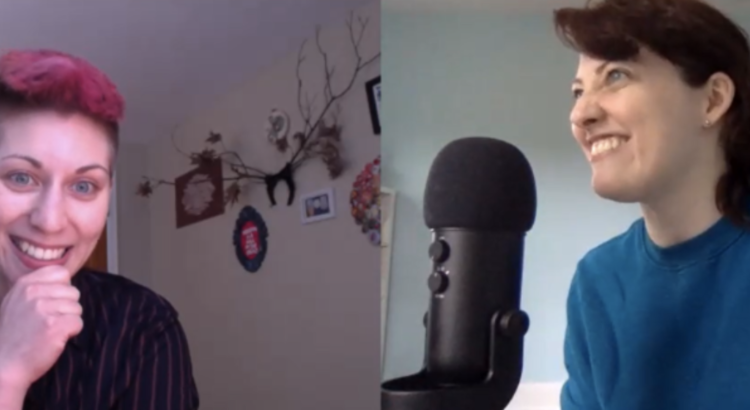Though I hate being on Zoom all day just as much as the next guy, this was a refreshingly creative break from the usual soul-crushing nature of staring at a screen.
Kate Stark plays Marnie, the child actor moved to stay in the entertainment biz through voice acting, and Megan Wesner plays Raven, the interviewer. There was a little bit of a surreal quality to the setup of the play, a pre-written interview between fictional characters delivered through a computer screen to an invisible audience. This feeling of layered disconnection fit well with the subject, though, as Raven interviews a woman miles and years away from her days on set, but whose mentality through adulthood has been shaped by that period. It makes us wonder which parts of our lives can outlast time; how much control we have over such an assignment of importance. Will all our actions made to establish our evolving character be fruitful, or will some long-dead part of ourselves always surpass new identities?
I’m speculating, but it felt like Marnie was inspired by Mara Wilson, the actress who played the title character Matilda in the movie adaptation of Roald Dahl’s novel. Since her childhood acting days, she’s moved on to podcasts and writing, far more removed from the limelight and everything that comes with it. While feelings of burnout and disillusionment are common amongst child actors after they grow up, Wilson is particularly similar to Marnie in how down-to-earth she is in interviews, seemingly well-adjusted with just a slight hint of neurosis. Both explore the idea of what it means to be part of the public domain, particularly at a young age; to be discussed in invasive detail by strangers who cannot see the person behind the character.
Between both the real and fictional ex-child actors, there is an understanding that one’s relationship with the world changes with early fame and adoration and the up-close nature of strangers’ perceptions of oneself. Acting can be a consumer of identity, but it may also create it. It’s a hard business to leave, being so emotionally and literally enveloping, and it can distort one’s relationships, need for approval, maybe even their sense of reality.
The interview with Marnie followed these sentiments, elevating them to extremes, but not to unrealistic heights.
Performance is both a creative expression and a lie; it builds up some character or version of something beyond oneself. Putting on a costume and makeup and a new voice and foreign mannerisms can occur anywhere from a TV set to a board meeting. It’s happening now as I write this, as I impersonate a deep-thinking intellectual with thoughts on The Psyche. Imposterism permeates the mind, and it never really leaves.
And both when the act of performance is recognized as fiction or accepted as a truthful depiction, it can affect one’s presentation of themselves, their understanding of and comfort with other people. Marnie’s discussion works to define a dissociative disorder amplified by the actor’s need to project inhuman versatility, and the creative’s need to continuously create.


